There’s a reason naming is a thriving industry, with top naming agencies charging a whopping $75,000 or more for their services. Catchy names make iconic brands, becoming inseparable from them. Of course, the success of the business isn’t just in its name, but the name that is too dull or ubiquitous makes it harder to gain exposure and popularity.
If you’re about to create a conversational chatbot, you’ll soon face the challenge of naming your bot and giving it a distinct tone of voice. What makes a good bot name? Are there any unwritten rules regarding names for bots? We’ve got your questions answered.
In this post, we’ll be discussing popular bot name ideas and best practices when it comes to bot naming. We’ll also review a few popular bot name generators and find out whether you should trust the AI-generated bot name suggestions. Finally, we’ll give you a few real-life examples to get inspired by.
Why is it important to give your chatbot a proper name?
There are many reasons why you may want to invest some time into giving your bot a recognizable name:
- Brand identity. A well-chosen name gives your chatbot a distinct personality. Just like a brand name, a chatbot’s name helps establish its character and convey its mood.
- User engagement. A human-like or relatable name can make users feel more comfortable interacting with the chatbot. In turn, a nameless bot is less likely to attract attention or evoke trust.
- Trust and credibility. Users are more likely to trust and take advice from a bot that has a legitimate-sounding name rather than a generic one.
- Personalization. A relevant name can make users feel like the chatbot is tailored to their needs, leading to a more personalized and enjoyable user experience.
- Easy communication. The ability to refer to the chatbot in conversation by its name ensures more natural and fluid interactions.
- Marketing and recognition. If you plan to market or promote your chatbot, a shareable name will make it a whole lot easier, leading to increased user adoption.
- Differentiation. In a world where everyone and their dog have some sort of online presence, a unique name can help your bot stand out from the competition.
- Consistency. Consistent naming across all interactions and platforms helps build a cohesive user experience. Your chatbot is no exception.
- Aesthetic appeal. The sound and aesthetics of a name can influence users’ perceptions of the chatbot. A pleasing or intriguing name is more likely to draw users in.
- Cultural and linguistic considerations. Depending on your target audience, cultural factors might play a role in choosing a name that resonates with your users on a deep emotional level.
Remember that the name you choose should align with the chatbot’s purpose, tone, and intended user base. It should reflect your chatbot’s characteristics and the type of interactions users can expect.
Crucial steps to naming your bot
In most cases, a commercial chatbot is required to have a short name without any special symbols or emoji. So, how do you improvise under such constraints? More importantly, where do you even start brainstorming?
Here are the main steps leading to the successful creation of a memorable bot name:
- Focus on your brand identity and values. The chatbot’s name should reflect them. Consider whether the name should be friendly, quirky, or strictly professional — this will help narrow down the focus.
- Try to come up with a name relevant to the chatbot’s purpose and the services it provides. It should convey the bot’s primary function or the problems it helps solve.
- Think about your target audience’s preferences, culture, and language. The name should resonate with them and in no way offend or confuse them.
- Choose a name that is easy to remember. Avoid overly complex names that users might struggle to recall.
- Aim for a name that stands out and is distinct from competitors. This helps users remember and differentiate your chatbot from others.
- The name should be easy to pronounce and spell. If users have trouble saying or typing the name, they might avoid interacting with the bot.
- Consider the voice and tone of the conversations the chatbot will have. The name should be compatible with the bot’s communication style.
- Check if the desired name is available as a domain name for your website, as well as on relevant social media platforms. If someone else already has a bot with the same name, pick another name to avoid confusion.
- Ensure that the name you choose doesn’t infringe on any existing trademarks or copyrights. You don’t want to face legal issues down the line.
- Think about potential future uses for the chatbot. Will it expand into other services or industries? Choose a name that allows for flexibility.
- Before finalizing the name, consider testing it with a small focus group of your target audience to get some feedback on how it speaks to them.
- Avoid short-lived and hyped words or buzzy slang that may get old in a couple of months. Opt for a timeless name that will stay relevant over time.
- If your business operates internationally, make sure the name doesn’t have negative connotations or meanings in other languages.
- Avoid giving your bot a stereotypical gendered or cliche persona, even if your brand is catering to one specific group. Opt for a name that feels fresh and doesn’t have any controversial connotations.
The name you choose will play a significant role in shaping users’ perceptions of your chatbot and your brand. Take the naming process seriously and invite creatives from other departments to brainstorm with you if necessary.
Bot name ideas and templates
Here are some creative directions you can take.
Functional names
These names are usually unambiguous. They clearly communicate who the user is talking to and what to expect.
- ServiceBot
- SupportBuddy
- AnswerBot
- Problem Solver
- Troubleshooter
This is a more formal naming option, as it doesn’t allow you to express the essence of your brand.
Personality-based names
If you’re intended to create an elaborate and charismatic chatbot persona, make sure to give them a human-sounding name.
- EthanExpert
- John K. Assistant
- LilyChat
- Max from [Company Name]
- Sophia The Bot
- Oliver AI
- EmmaBot
- MiaMentor
- Noah The Navigator
- Oracle Olivia
This will make your virtual assistant feel more real and personable, even if it’s AI-powered.
Descriptive names
In your bot name, you can also specify what it’s intended to do and what kind of information one can expect to receive from it.
- QuickHelp
- Virtual Agent
- InsightBot
- ChatAdvisor
- Front Desk
To a tech-savvy audience, descriptive names might feel a bit boring, but they’re great for inexperienced users who are simply looking for a quick solution.
Sci-fi and tech names
Give your chatbot a cool edge by choosing a superhero-like name.
- Challenge Seeker
- CosmicMind
- Pathfinder
- CodeGuru
- Bug Hunter
- The Forecaster
- CodeWhisperer
- AI Mentor
Names like these will make any interaction with your chatbot more memorable and entertaining. At the same time, you’ll have a good excuse for the cases when your visual agent sounds too robotic.
Friendly names
Another way to make your virtual assistant more inviting is to give it an informal name that conveys an open, laid-back attitude.
- ChattyCharlie
- AI Buddy
- VirtualBro
- Jolly Jay
- Virtual Pal
- Joyful John
Naturally, this approach only works for brands that have a down-to-earth tone of voice — Virtual Bro won’t match the facade of a serious B2B company.
Professional names
If you work with high-profile clients, your chatbot should also reflect your professional approach and expertise.
- ProAdvisor
- CorporateConnect
- EnterpriseBot
- AI Assist
- BizSage
- ExpertizeBot
Professional-sounding names like these will make your bot appear more trustworthy and qualified.
Witty names
You can put emphasis on the depths of knowledge your conversational bot possesses by naming it something like:
- CaringBot
- Wisdom Well
- EverGuide
- TirelessAdvisor
- Avid Talker
- KnowItAllBot
These names for bots are only meant to give you some guidance — feel free to customize them or explore other creative ideas. The main goal here is to try to align your chatbot name with your brand and the image you want to project to users.
3 bot name generators every creator should know about
Let’s assume you want to give your creativity a little break. In that case, a chatbot name generator may be your best friend. This is a tool that helps you come up with creative and relevant names for your chatbot.
These generators often use artificial intelligence and various algorithms, patterns, and word combinations to suggest names that align with your specified preferences, such as tone, industry, and style. Let’s look at the most popular bot name generators and find out how to use them.
ChatGPT
ChatGPT is the easiest way to utilize the power of AI for brainstorming bot names. All you need to do is input your question containing certain details about your chatbot. This could include information about your brand, the chatbot’s purpose, the industry it operates in, its tone (cheeky, professional, etc.), and any keywords you’d like to include.
 ChatGPT as a bot name generator
ChatGPT as a bot name generator
Naturally, the results aren’t always perfect, nor are they 100% original, but a quick Google search will help you weed out the names that are already in use. The best part is that ChatGPT 3.5 is free and can generate limitless options based on your precise requirements.
Oberlo
Oberlo’s Business Name Generator is a more niche tool that allows entrepreneurs to come up with countless variations of an existing brand name or a single keyword. This is a great solution for exploring dozens of ideas in the quickest way possible.
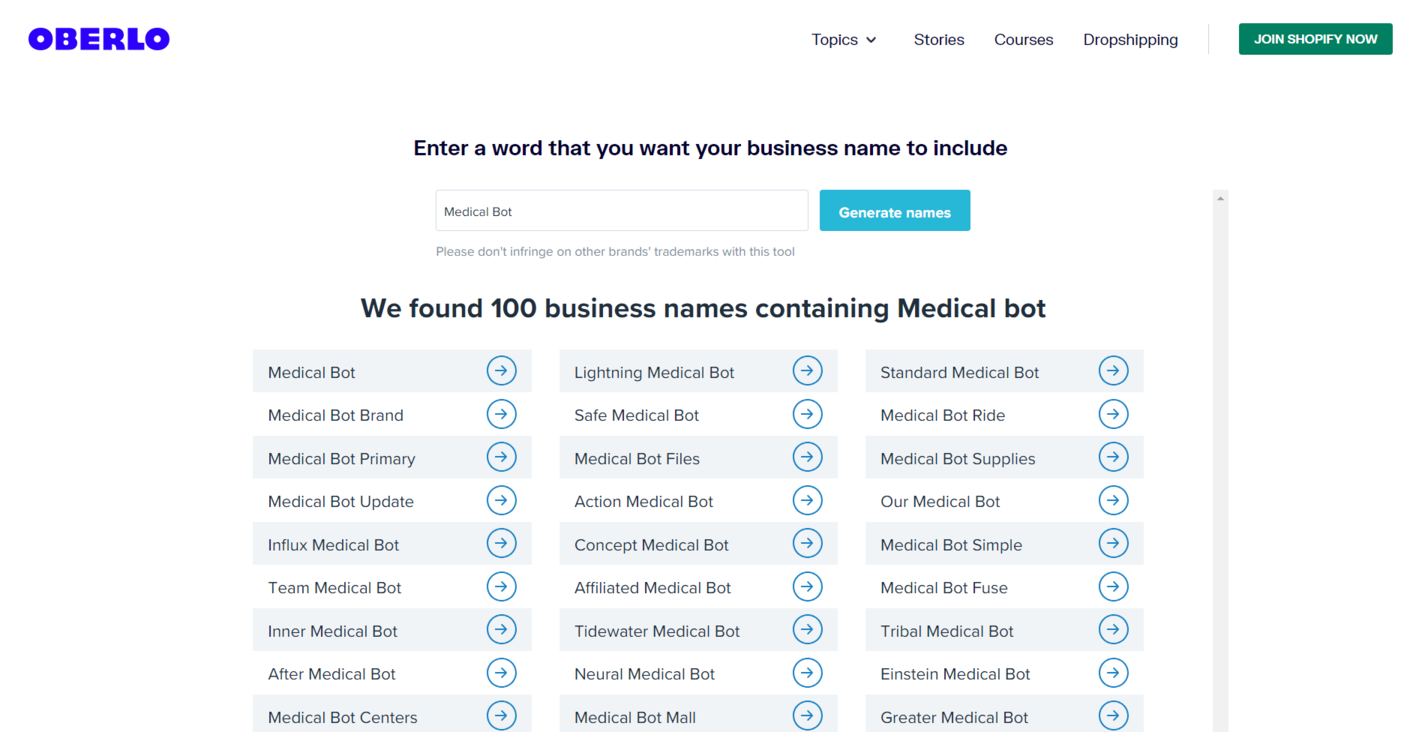 Businesses Name Generator by Oberlo
Businesses Name Generator by Oberlo
You can use this tool completely free of charge. The generator is more suitable for formal bot, product, and company names. As you can see, the generated names aren’t wildly creative, but sometimes, that’s exactly what you need.
BotsCrew
The Creative Bot Name Generator by BotsCrew is the ultimate tool for chatbot naming. It provides a great deal of finesse, allowing you to shape your future bot’s personality and voice. You can generate up to 10 name variations during a single session.
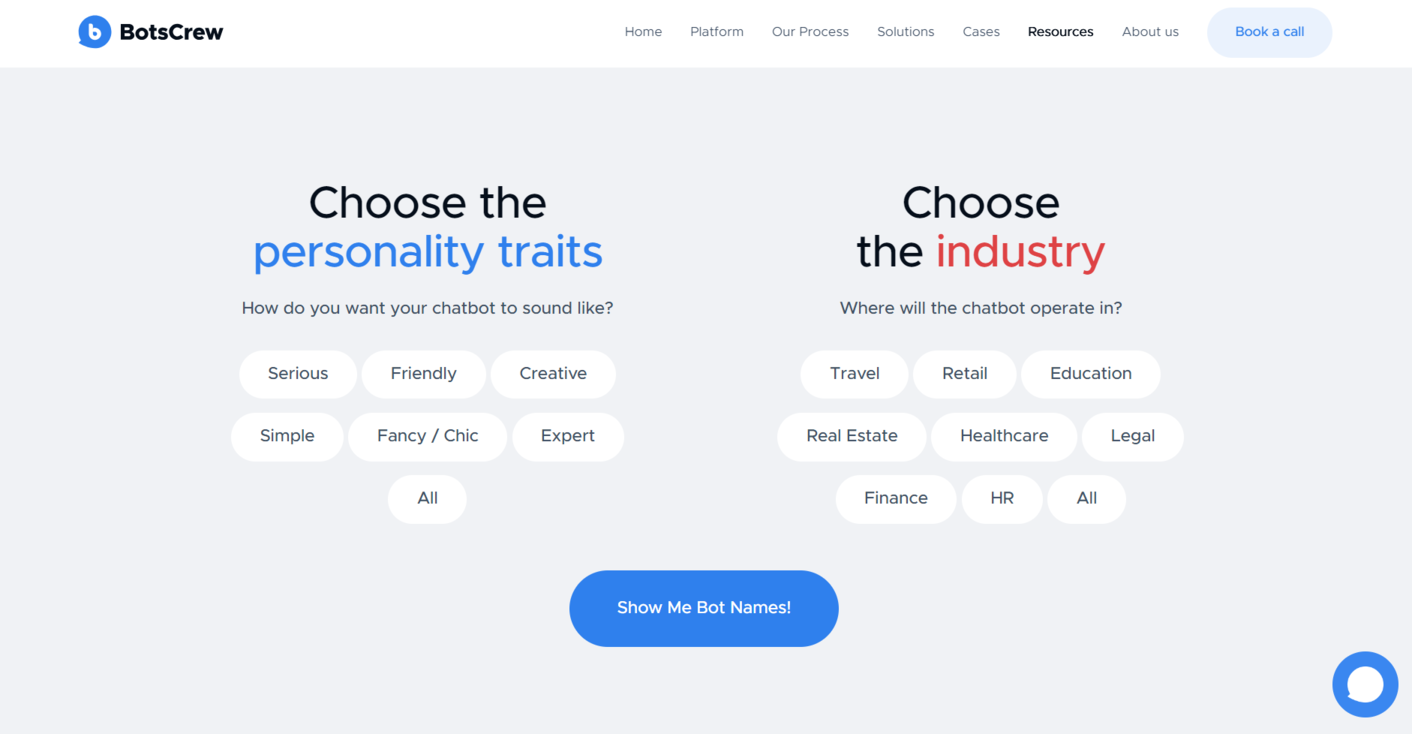 Creative Bot Name Generator by BotsCrew
Creative Bot Name Generator by BotsCrew
The bot name generator is available for free. It can suggest beautiful human names as well as powerful adjectives and appropriate nouns for naming a chatbot for any industry. Moreover, you can book a call and get naming advice from a real expert in chatbot building.
5 memorable and peculiar real-life bot name examples
Let’s see how other chatbot creators follow the aforementioned practices and come up with catchy, unique, and descriptive names for their bots.
Woebot
What do you call a chatbot developed to help people combat depression, loneliness, and anxiety? Suddenly, the task becomes really tricky when you realize that the name should be informative, but it shouldn’t evoke any heavy or grim associations.
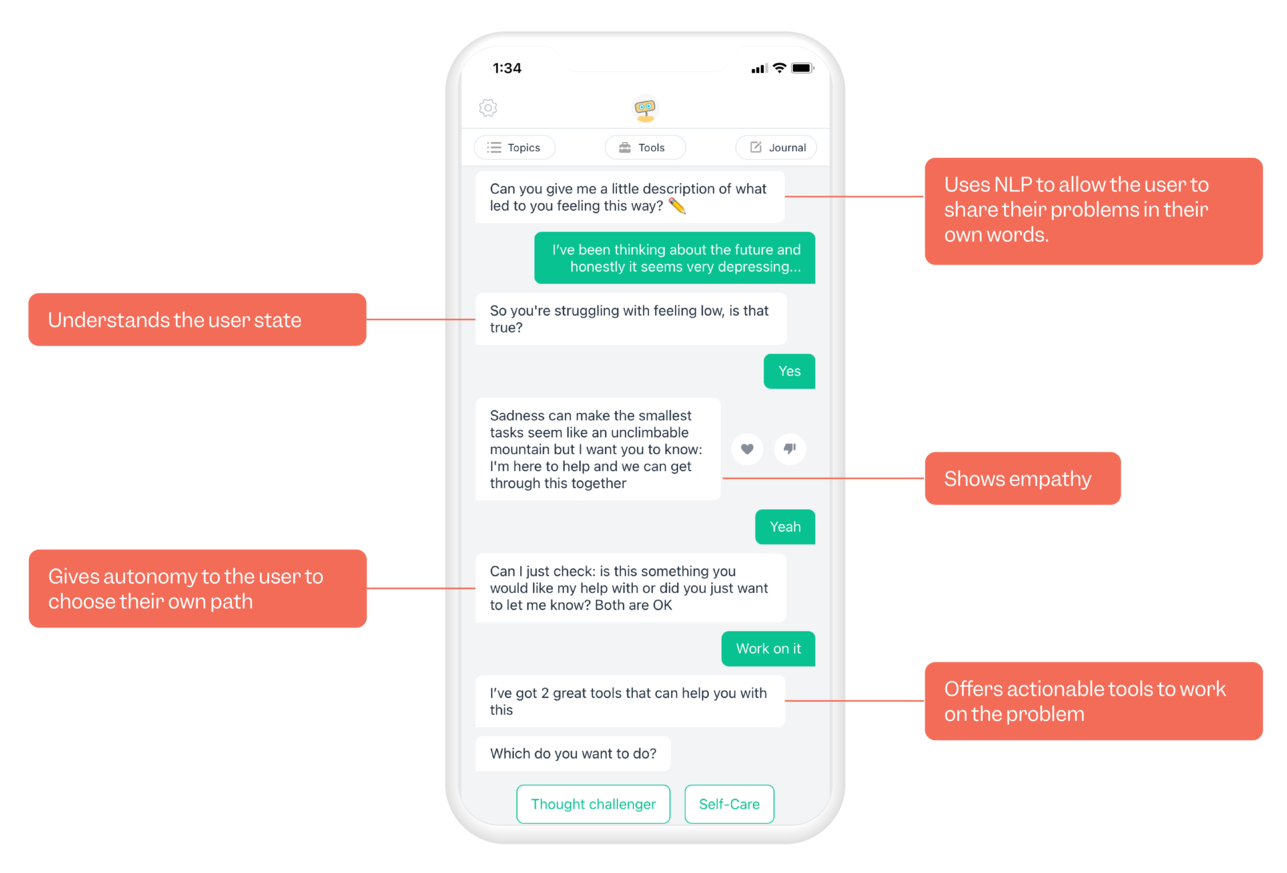 A chatbot for mental health support
A chatbot for mental health support
The Woebot team seems to have hit a perfect middle ground. The word “woe” has tragic but also poetic, gentle connotations to it. It’s deep, tasteful, and meaningful — and it’s also short and pairs really well with “bot.”
Zenify
The “ify” naming trend is here to stay, and Spotify might be to blame for it. That said, Zenify is a really clever bot name idea because it combines tech slang with Zen philosophy, and that blend perfectly captures the bot’s essence.
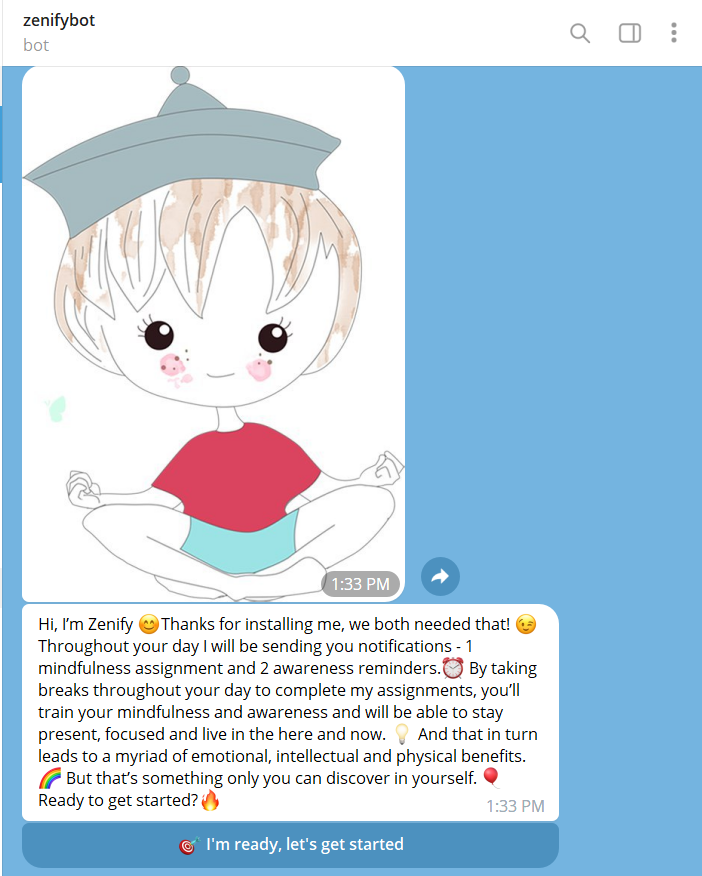 A chatbot for productivity and mindfulness
A chatbot for productivity and mindfulness
Zenify is a technological solution that helps its users be more aware, present, and at peace with the world, so it’s hard to imagine a better name for a bot like that. You can “steal” and modify this idea by creating your own “ify” bot.
DailyBot
This chat tool has a seemingly unassuming name, but, if you look closer, you’ll notice how spot-on it is. DailyBot was created to help teams make their daily meetings and check-ins more efficient and fun. So, the name perfectly encapsulates the purpose of the bot.
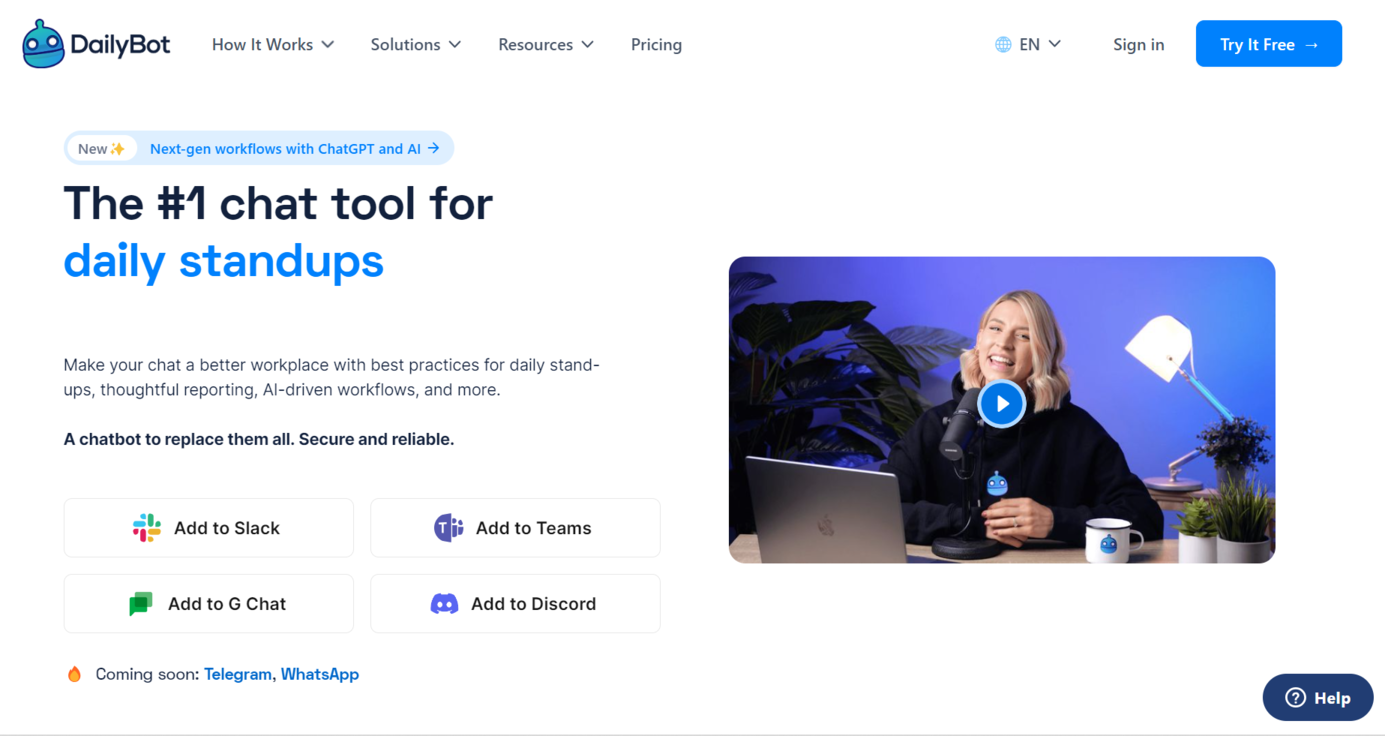 A chatbot for daily stand-up meetings
A chatbot for daily stand-up meetings
Using adjectives instead of nouns is another great approach to bot naming since it allows you to be more descriptive and avoid overused word combinations.
Lionbot
If you’ve created an elaborate persona or mascot for your bot, make sure to reflect that in your bot name. Here’s a beautiful example.
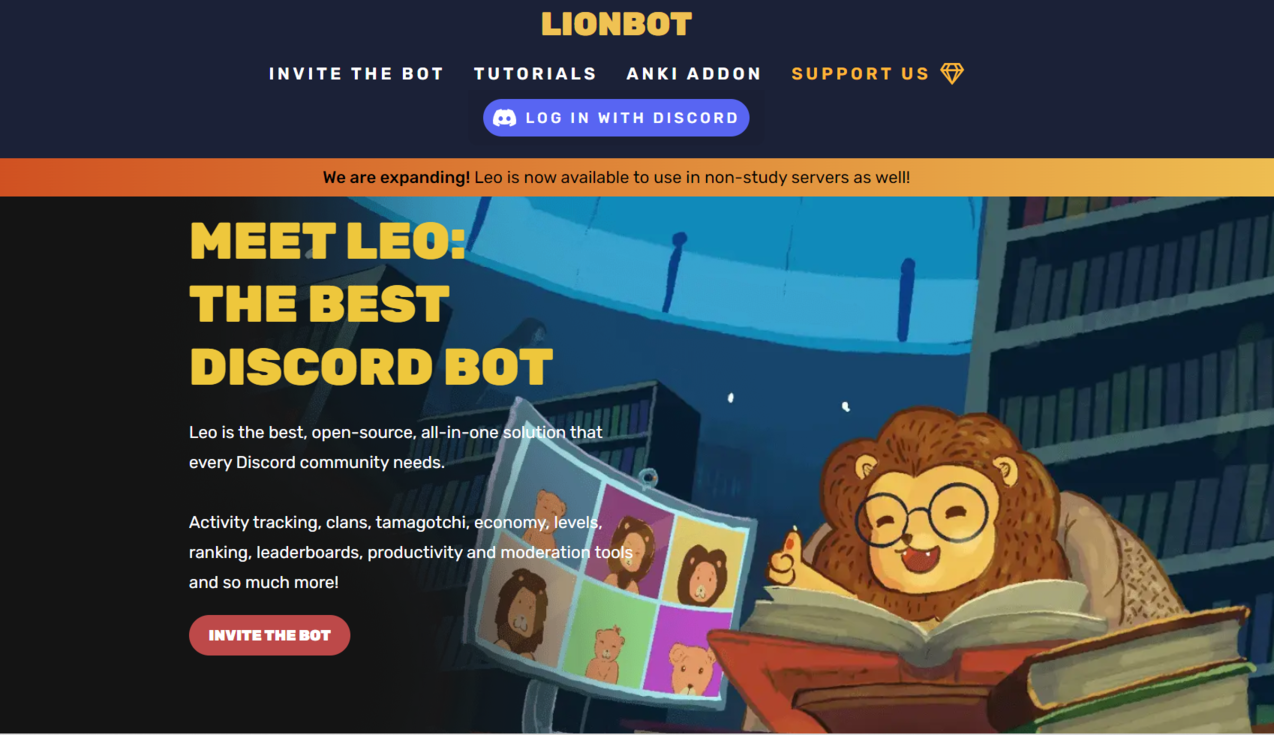 A chatbot for studying and productivity
A chatbot for studying and productivity
LionBot is a Discord bot for studying — it features reminders, trackers, and other time management tools. It’s known for its charming mascot Leo, whom we can see in detail on the LionBot website. The unique name helps users instantly differentiate it from other, more generic study bots.
PositivityPal
Normally, we’d encourage you to stay away from slang, but informal chatbots just beg for playful and relaxed naming. The PositivityPal bot illustrates that perfectly. This bot offers Telegram users a listening ear along with personalized and empathic responses.
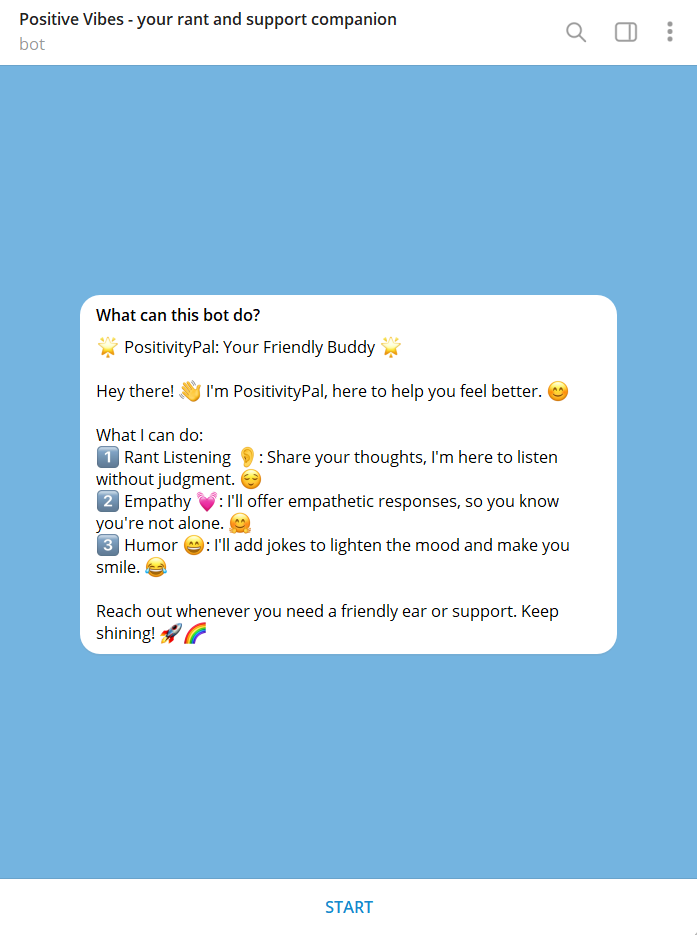 A chatbot for emotional support and rant listening
A chatbot for emotional support and rant listening
PositivityPal is a lightweight, original, and memorable name for a chatbot. It clearly conveys the main idea behind the bot, and it’s appropriate for any other platform besides Telegram.
Create a versatile chatbot and more with SendPulse
Whether your goal is automating customer support, collecting feedback, or simplifying the buying process, chatbots can help you with all that and more. When it comes to crafting such a chatbot in a code-free manner, you can rely on SendPulse.
Our intuitive chatbot builder empowers you to effortlessly create bots for websites and popular platforms like Instagram, WhatsApp, Facebook Messenger, or Telegram. You can build complex conversation flows in our visual builder and test your bot before launching it.
By signing up for a SendPulse account, you’ll unlock a treasure trove of marketing and sales automation tools, including email service, a pop-up builder, SMS services, a website builder, CRM, and much more. Forget about having to juggle between different apps and messaging platforms — SendPulse can become your one-stop destination for all your sales and marketing needs. Create your free account now and see for yourself!